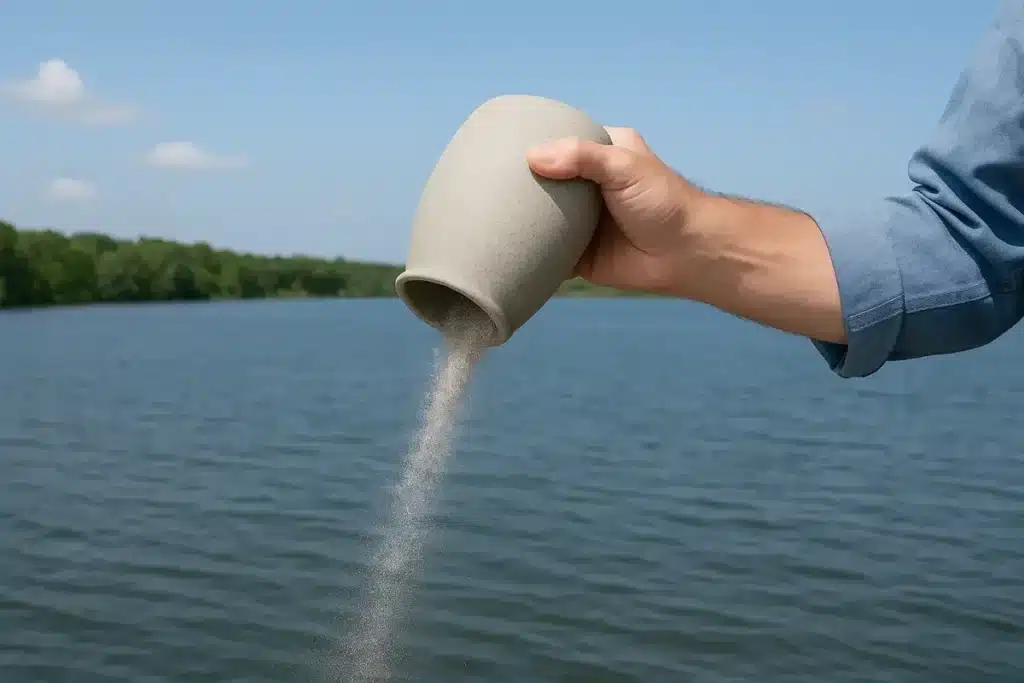Scattering ashes can be a meaningful and symbolic way to say goodbye. In Florida, it’s legal to scatter cremated remains in the ocean, and with certain permissions, also in inland locations like lakes, rivers, and state parks. Here’s a complete guide to what’s allowed—and what’s not—when scattering ashes in the Sunshine State.
Scattering Ashes in the Ocean Off Florida’s Coast
Florida permits the scattering of ashes in the ocean as long as you follow federal guidelines. The Environmental Protection Agency (EPA) sets the rules for ocean-based ash scattering nationwide.
Key requirements include:
- Ashes must be scattered at least 3 nautical miles from shore
- You must notify the EPA within 30 days of the scattering
- Only biodegradable items may be released into the water (no plastics or metals)
No special state permit is needed for ocean scattering, but you must submit the required EPA burial at sea form.
Can You Scatter Ashes in Florida Lakes and Rivers?
Yes—with permission. Lakes, rivers, and inland waterways fall under state and local jurisdiction, so you must request approval before scattering.
Florida Department of Environmental Protection (FDEP)
For most public lakes and rivers, reach out to the Florida Department of Environmental Protection or the managing agency for the waterbody. While ashes are not hazardous, local water quality protections may still apply.
You’ll typically need to:
- Ensure that access is allowed (some sites prohibit ceremonial gatherings)
- Use biodegradable urns or scatter directly
- Avoid leaving flowers with plastic or synthetic parts
Privately owned lakes or waterfronts require owner permission in writing. Always confirm land ownership before making arrangements.
Scattering Ashes in Florida’s State Parks
Florida’s state parks are serene locations that often attract families seeking peaceful final resting places for their loved ones. While scattering ashes in state parks is not broadly prohibited, you’ll need official approval from park management.
Here’s what to do:
- Contact the park office ahead of time (see Florida State Parks Directory)
- Request written permission from the park manager
- Schedule scattering at a non-peak time to avoid disrupting other guests
- Follow the Leave No Trace principle—no permanent markers, plaques, or artificial flowers
Popular Florida parks where scattering has been permitted in the past (with approval) include:
- Myakka River State Park (near Sarasota)
- Henderson Beach State Park (Destin)
- Everglades National Park (via National Park Service—separate process)
- Bahia Honda State Park (Florida Keys)
- Blue Spring State Park (Orange City)
Always confirm rules at each specific park.
Scattering Ashes on Florida Beaches
Ashes may not be scattered directly onto Florida’s beaches unless local authorities approve it. While beach-based ceremonies are common, the ashes themselves must usually be taken offshore if you are within state waters.
Here’s a safe approach:
- Hold a symbolic beach ceremony
- Use a boat or plane to scatter ashes legally offshore beyond the 3-mile limit
- Confirm with the local county or municipality if permits are required for gatherings
Hiring a Florida Charter for Sea Scattering
If you’d prefer help with the process, many charter companies in Florida specialize in ash scattering services and handle all regulatory steps. They typically offer:
- Boat services beyond 3 nautical miles
- U.S. Coast Guard–compliant procedures
- A certificate of scattering
- Optional flowers or rituals
Service areas include:
- Tampa Bay
- Miami
- Fort Lauderdale
- St. Petersburg
- Key West
- Jacksonville
Rates range from $300 to $1,000+ USD, depending on the type of service (private vs. unattended).
Aerial Scattering in Florida
Ashes can also be scattered over the ocean by aircraft. This is legal and must follow the same 3 nautical mile rule. Aerial scattering providers often include a commemorative certificate and a recorded GPS location. Cost typically ranges from $500 to $1,500 USD.
Summary Table: Florida Ash Scattering Options
| Location | Is it Legal? | Special Requirements | Notes |
|---|---|---|---|
| Ocean (3+ nautical miles) | Yes | EPA notification within 30 days | EPA Burial at Sea Info |
| Inland lakes and rivers | With permission | Must contact local authority | Typically allowed if biodegradable |
| State parks | With park approval | Written permission needed | No permanent memorials |
| Beaches | Symbolic only | Actual scattering offshore | Local permits may be needed |
| Aerial scattering | Yes | Must follow EPA ocean rules | Common in South Florida |
Common Questions About Ash Scattering in Florida
Here are common questions answered about scattering ashes in Florida waters including inland lakes and rivers.
You shouldn’t. While ashes are not considered a health hazard, EPA reporting is legally required for ocean scattering, and permission is needed for inland locations.
You could be fined for violating local ordinances. It’s better to request permission or limit the beach event to a ceremony without releasing remains there.
No. Cremated remains are sterile and safe. The issue is with non-biodegradable containers or objects, which can harm wildlife and marine environments.
Yes, but it’s managed by the National Park Service, so you must contact them directly for guidance and permission. NPS Ash Scattering Policy
Not on public lands or waters. Florida law prohibits placing permanent markers in natural settings like parks, beaches, or waterways.

